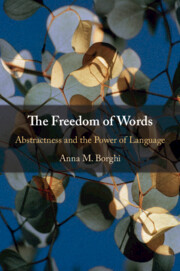Introduction
Published online by Cambridge University Press: 20 July 2023
Summary
This book will tell the story of the power of words and of how this power is particularly crucial for abstract concepts and the words that express them – words like “fantastic,” “freedom,” “furious,” and “ideas.” In recent years, the topic of abstract concepts has become increasingly debated, as testified by the special issues on the subject (e.g., Borghi et al., 2018, 2022; Bolognesi & Steen, 2018), and by a recently edited book (Bolognesi & Steen, 2019) and two monographs focusing on the theme (Borghi & Binkofski, 2014; Dove, 2022).
- Type
- Chapter
- Information
- The Freedom of WordsAbstractness and the Power of Language, pp. 1 - 12Publisher: Cambridge University PressPrint publication year: 2023

